|
The Inquirer and Tariff Advocate, a campaign paper, was issued
from The Cabinet press in 1844 hy Chas. Boynton.
The Canton Weekly Citizen was begun Jan. 1,1852, by J. S. Sar-
geaut, and continued 4 weeks.
The Canton Independent was removed from Madrid in 1S53, and
published by O. L. Ray. It was soon discontinued.
Tlie St. Lawrence Plain. Dealer was begun in 1855
hy Goodrich & Remington; it is now published hy S. P.
Remington.
Young America was published hy C. W. Ames.
The other papers in the co. have^ been— #
The Northern New Yorker, begun1 April 2,1849, at Gouverneur,
by W. M. Goodrich and M. F. Wilson; and issued a little
more than one year.
The St. Lawrence Advertiser was begun in 1850, at Gouverneur,
and a few numbers issued.
The Laborer was commenced in July, 1852, at Gouverneur, hy
M. Mitchel. It was succeeded toy
The St. Lawrence Free Press, begun in 1853 by J. J. Emmes, and
afterward published by G. K. Lyman. It was removed
to Ogdensburgh in the fall of 1854 and united with
The Sentinel.
The Progressive Age was begun in June, 1855, at Gouverneur,
by G. D. Greenfield. It was removed to Potsdam in
1856, and changed to The Northern Freeman.
The True Democrat was begun in May, 1850, at Madrid, by M.
F. Wilson. In its 2d year it became
The Columbian Independent; was continued 1 yr., when it was re¬
moved to Canton and changed to the Canton Independent.
1 This place became a French military station, and a magazine
for supplying expeditions sent to their s. w. posts; and from this
point were fitted out many of the parties that ravaged the back
settlements of N. Y., Penn., and Va.
2 This island was called by the Indians “ O-ra-co-nen-ton,”
and by the French “ Isle Royale.” It is now called Chimney
Island, from the ruins still visible.
8 Upon tho approach of Lord Amherst in 1760, the fort at the
mouth of the Oswegatchie was abandoned. The island was in¬
vested on the 18th of Aug. Upon Gallop Island the English
found a number of scalps, which so exasperated them that they
burned the chapel and houses, the ruins of which ar still visi¬
ble. The batteries opened on the 23d, and oil the 25th the
place, under Pouchot, surrendered. The English named the fort¬
ress, Fort Frederick Augustus. On their voyage down the river
from this place to Montreal, the English lost in the rapids 46
bateaux, 17 whaleboats, and 84 men. The island was occupied
hut a short time, and the works soon fell into ruins.—Knox's
Journal; Mante’s Hist.; Memoir of Pouchot; Entick’s Hist. |
4 These Indians claimed large tracts of land and leased them
to parties from Canada, who cut off the most valuable timber
and committed other wasteful depredations.
8 The “ Ten Towns” were sold at auction hy the land commis¬
sioners in 1787, in quarter sections, except Madrid and Oswe¬
gatchie, which were sold in square miles. In each town a mile
square was reserved for literature, and another for the gospel
and schools.
6 The original townships in this tract were named as follows :
—1. Sherwood; 2.Oakham; 3.Mortlake; 4.Harewood; 5. Janes--
town; 6. Pierrefield; 7. Granshuck; 8. Hollywood; 9. Kildare;
10. Matildavale; 11. Wick; 12. Riversdale ; 13. Cookham; 14.
Catharineville; 15. Islington; 16. Chesterfield; 17. Grange; 18.
Crumack.
7 The original townships of this tract were named as follows:
—1. Hammond; 2. Somerville; 3. DeWitt; 4. Fitz William; 5.
Ball.vbeen; 6. Clare; 7. Killarney; 8. Edwards; 9. Sarahsburgh;
10.Clifton; 11. Portaferry; 12. Scriba; 13.Chaumont; 14.Bloom¬
field ; 1-5. Emilyville.
8 These tracts were conveyed to Dan’l McCormack by patent
in 1795-93.
9 The town of Massena comprises this portion of the co.
10 The islands were sold in 1823.
11 A regiment of militia was stationed at Ogdensburgh during
the summer of 1812. In July, 1812, a fleet of 6 schooners—
caught at Ogdepsburgh hy the war—attempted to reach tho
lake, but were intercepted: 2 were burned, and the rest hastened
back. On the last day of July a bloodless engagement took place
between the American schooner, Julia, and the British vessels,
Earl of Moira and Duke of Gloucester. In Sept. an attack was
made uflon a number of bateaux at Toussaint Island, opposite
Lisbon, in which the Americans lost one and the British several
men. On the 2d of Oct. the British made a show of attacking
Ogdensburgh, and on the 4th made a real attack, hut were re¬
pulsed, with the loss of a gunboat and 2 men killed. In Jan. tho
Americans surprised and captured Brockville, liberated several
prisoners, paroled 50 of the citizens, and took a quantity of stores.
On the 22d of Feb. the British, in retaliation, captured Ogdens¬
burgh. carried away the cannon and stores, ^id paroled a large
number of citizens, who were afterward exchanged for those of
Brockville. Late in 1813 Gen. Wilkinson’s expedition passed
dowr. the St. Lawrence, and sufi'ered a disastrous defeat at Crys-
lers Field, opposite Louisville. The British folloived the retreat¬
ing Americans and landed at Hamilton, (Waddington.)—Hough's
Hist. St. Law. <£• Frank. Cos.
12 The lands in the co have doubled in value hy the completion
of the railroads. |
